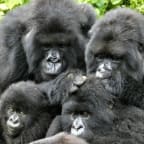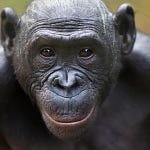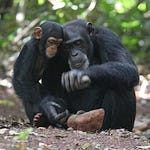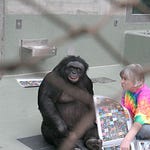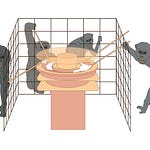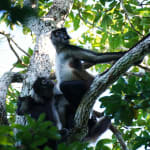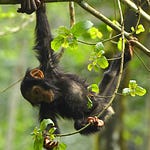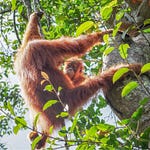Rethinking the Benefits of Being Social
Friendship is often touted as a universal good—buffering stress, promoting health, even boosting survival. But in the densely vegetated slopes of Rwanda’s Volcanoes National Park, the lives of Gorilla beringei beringei tell a more nuanced story.
A two-decade study of 164 wild mountain gorillas has revealed that social connections don’t offer blanket benefits. Instead, their effects on health and reproductive success shift depending on group size, individual sex, and social strategy. For some, being bonded means safety and support. For others, it may bring stress, disease, or fewer offspring.
“Having a lot of strong social relationships is often really good—but sometimes it isn’t,” said primatologist Robin Morrison, a senior researcher at the University of Zurich.
The research, published in the Proceedings of the National Academy of Sciences1, was conducted by a collaborative team from the Dian Fossey Gorilla Fund, the University of Zurich, and the University of Exeter. It challenges the assumption that sociability always enhances evolutionary fitness—and offers a new lens on the origins of complex human relationships.
The Price of Popularity
Mountain gorillas are famously cohesive primates, typically living in groups of around a dozen individuals, often anchored by a single dominant male. But beneath this apparent stability lies a subtle web of alliances, rivalries, and individual variation.
The team found that female gorillas in smaller groups who maintained close social bonds were less likely to fall ill—but they also had fewer offspring. In contrast, socially integrated females in larger groups tended to get sick more often but bore more infants.
For males, the trade-offs were different. Strong social bonds did not predict greater reproductive success or fewer illnesses. In fact, males with the tightest social connections were more likely to get sick—but less likely to suffer injuries in physical conflicts.
“It’s possible that males expend more energy by having close social ties,” Morrison explained. “They may be defending females and offspring, and the stress of this responsibility might suppress immune function.”
In this way, the costs of popularity mirror some patterns in human societies, where social capital can provide influence or protection—but also increase emotional labor, stress, and exposure to pathogens.
The Leadership of Individuals
The researchers also noted remarkable individual variation in how gorillas navigated their social worlds. Some were peaceful and rarely intervened in disputes yet held high status. Others were domineering but no more reproductively successful. The implication? There’s more than one way to thrive in gorilla society.
One such case was Titus, a silverback whose early life was marked by profound trauma—poachers killed many of his family members, and his mother died when he was four. Despite these setbacks, he rose to dominance at just 15 and retained his position for two decades.
“Titus had an exceptionally gentle and calm nature,” noted one team member. “That seemed to earn him respect and attraction from the group.”
By contrast, Maggie, a high-ranking female, was known for her aggression and assertiveness. She regularly groomed and protected others—behaviors that won her influence. After her group’s dominant male died unexpectedly, she stepped into a leadership role typically reserved for males, guiding the group through a vulnerable transition.
Evolution Is Not a Popularity Contest
While the study focuses on gorillas, the questions it raises extend far beyond: What does it mean to be social? Does friendship always equate to success? And why do some thrive on large social networks, while others do better with just a few tight bonds?
“This research shows that it’s not always best to be maximally social,” Morrison said. “Some individuals succeed with just a small circle of strong ties. The environment and group dynamics matter.”
For anthropologists, the findings hint at the evolutionary pressures that shaped human social variability. Just as some gorillas benefit from gregariousness and others from selectivity, early humans likely faced similar trade-offs as they formed bands, tribes, and eventually complex societies.
The gorilla data suggest that the path to fitness isn't a straight line—but a web of personal traits, environmental constraints, and group-level dynamics. In other words, evolution favors flexibility.
Related Research and Further Reading
The current study builds on a growing body of work exploring how primate social behavior maps onto health, fitness, and evolution.
Silk, J. B., Beehner, J. C., Bergman, T. J., Crockford, C., Engh, A. L., Moscovice, L. R., ... & Wittig, R. M. (2010). Strong and consistent social bonds enhance the longevity of female baboons. Current Biology, 20(15), 1359–1361. https://doi.org/10.1016/j.cub.2010.05.067
Archie, E. A., Tung, J., Clark, M., Altmann, J., & Alberts, S. C. (2014). Social affiliation matters: Both same-sex and opposite-sex relationships predict survival in wild female baboons. Proceedings of the Royal Society B: Biological Sciences, 281(1793), 20141261. https://doi.org/10.1098/rspb.2014.1261
Schülke, O., Bhagavatula, J., Vigilant, L., & Ostner, J. (2010). Social bonds enhance reproductive success in male macaques. Current Biology, 20(24), 2207–2210. https://doi.org/10.1016/j.cub.2010.10.058
Morrison, R. E., Ellis, S., Martignac, V., Stoinski, T. S., & Eckardt, W. (2025). Group traits moderate the relationship between individual social traits and fitness in gorillas. Proceedings of the National Academy of Sciences, 122(20). https://doi.org/10.1073/pnas.2421539122
Morrison, R. E., Ellis, S., Martignac, V., Stoinski, T. S., & Eckardt, W. (2025). Group traits moderate the relationship between individual social traits and fitness in gorillas. Proceedings of the National Academy of Sciences of the United States of America, 122(20). https://doi.org/10.1073/pnas.2421539122

